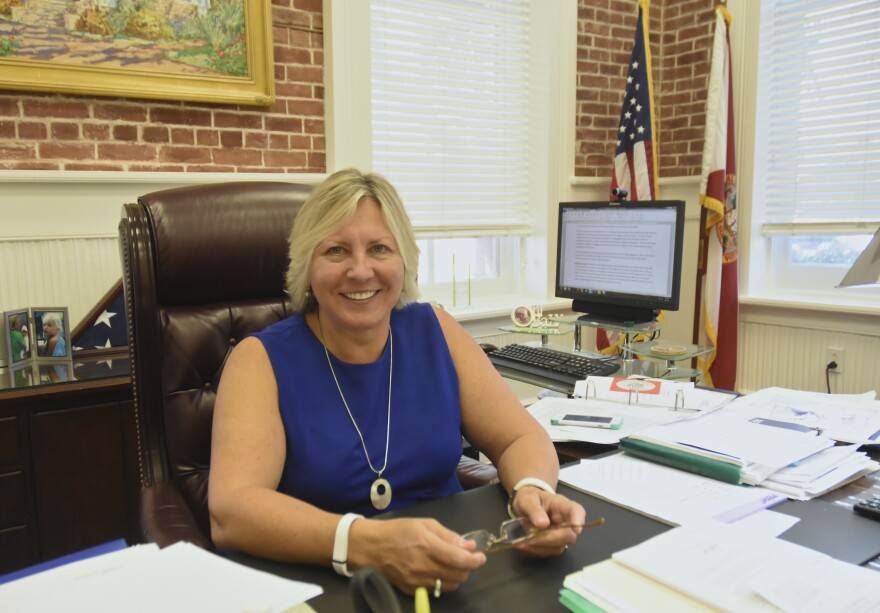The Florida Keys have been in an affordable housing crisis for years. It’s a simple matter of limited supply and very high demand. Then, in September, Hurricane Irma destroyed or caused major damage to thousands of homes — more than 7 percent of the homes in the Keys were destroyed or suffered major damage.
Monroe County Commissioner Heather Carruthers is leading the county commission's efforts to address the housing crisis. She recently spoke with WLRN's Keys reporter Nancy Klingener.
WLRN: I’ve lived here for more than 25 years and affordable housing has always been an issue. What’s different now? How has Hurricane Irma changed the housing picture in the Keys?
Carruthers: I think it’s done a couple of things. The first is immediate in that we’ve lost thousands of homes, really, primarily in the areas where most of our workforce lived. It also revealed a lot of what I call unconventional housing that wasn’t on anybody’s radar, wasn’t on the books. People just renting a bedroom in somebody else’s house. Liveaboards that aren’t even counted in the census. I think people are seeing the impacts of the lack of that housing right now, when you drive to MacDonald’s and it’s now hiring, when there’s an even longer wait for your coffee at Starbucks and there’s only one teller at the Bank of America.
It’s going to get worse before it gets better. I know people who are hanging on like till the end of this season and are planning to relocate. Teachers and cops and firefighters and the people who really make the community whole and run are the ones that are getting impacted.
Can we build our way out of this?
Between now and 2023 we are legally allowed to hand out only 1,970 more building permits. So 700 of those are earmarked for affordable [housing] and the balance are market-rate. That’s just in unincorporated Monroe [County]. The cities have different numbers, but still you’re talking about maybe being able to meet a third of the need — and that’s assuming that everything goes to affordable or workforce housing. So we can’t completely build our way out of it. I think we’re going to have to do a lot of thinking about other things that we need to do, to convert existing housing back to workforce housing.
In Tallahassee right now, they’re considering a law that would prohibit local governments from regulating vacation rentals at all. If that were to pass, what would happen in the Keys?
Basically, bye-bye nurses, bye-bye teachers, bye-bye the people who really make the community run. We don’t live in a place, particularly in the Lower Keys, where people can commute to work. We simply don’t. We have one road in and out. So we really need to make sure that the support group, the workforce can live in our communities. Besides which, it makes for a much more robust, diverse and lively community. So it would literally kill us.

I also have a real estate license. And I can tell you that there are lots of people who are always looking for transient rentals — how can I rent this place out? Is this a place I can rent out? I’m like, no you cannot, no you, cannot. So it would dramatically impact us.
Luckily our legislators, both our senator and our representative, are working hard to include a carve-out so the Keys will not be impacted this way. But this is one of those things where the state really shouldn’t be meddling with local issues.
Are there other places you’re looking at, other cities, other regions, that have had similar problems and have figured out solutions?
We haven’t found any place that’s quite like us that has figured out a solution. Of course, we’ve looked at places like Martha’s Vineyard, but they take a ferry back and forth and they tend to be seasonal. You go up there and there’s not a lot of people there in the wintertime. You look at places like Aspen and Vail, but they have land surrounding them so people can drive.
So there’s no place, I think, yet that has adequately solved the solution. No place quite like the Keys. We have governmental regulations that have restricted our development. We obviously have only one road in and out. We have limited land; we have endangered species. This combination is really unique to us down here.
I think one of the things is that we have to be really determined that this is a problem that we’ve got to solve, or at least work much harder at. There are all kinds of attitudes that might have to change a little bit to do that. There might be some growing pains, but in the long run it’s going to be healthier for our economy. And our way of life.






